You might be one of those smug types that completed all their Christmas shopping at the start of November and now panicking that your children’s present pile is a little small, or you may one of those “leave it till the last minute” types and now you’re stuck for ideas. Wherever you are with your Christmas shopping, here are some great little stocking fillers that your children will love, all available online to be delivered by Christmas. All of these toys will help your child develop their abilities in some way. We’ve kept the budget to below £20 and have divided them into age groups to help make your shopping experience easier!
Babies & Toddlers: 0 to 2 Years
Let’s be brutally honest, most children under two will probably prefer the box the presents arrived in, but if we did just present our child with an empty box on Christmas day, huge Mum guilt would set in (even if they did sit happily playing in it for an hour). At this age, bright colours and loud noises are a huge hit.
Munchkin Bath Dunkers Toy
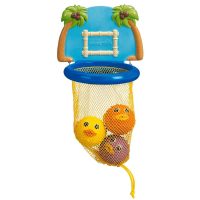
Your little one might have plenty to keep them occupied in the lounge and bedroom, but what about in the bath? This Bath Dunkers Toy from Munchkin has a dual use. Kids can try and throw the fish into the basket that attaches to the bath with suckers, or they can use the fish as squirters (to spray you). This is a good way of getting some stealth practice in for those essential coordination skills.
Lamaze Bendy Bug Highchair Toy
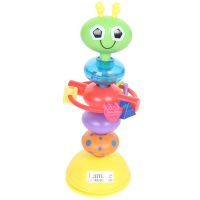
Picture the scene, it’s been at least 30-minutes since your growing weaned baby ate, and now they have reached peak hunger and the wailing has begun. Whilst you desperately try and throw together something slightly nutritious you need something that will serve as a distraction. This Bendy Bug toy from Lamaze uses suction to stick onto your baby’s highchair tray (or any other smooth surface) and bends and rattles as your child swats it. The toy will help distract your child temporarily, and is a cute and fun way for your child to learn about cause and effect.
Beatrix Potter Peter Rabbit Wooden Picture Blocks Set
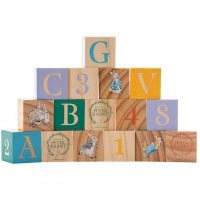
Wooden toys have seen a resurgence this year with many more budget brands now offering them alongside their plastic alternatives. There’s something timeless about them, and they offer up many options for imaginative play. We just love this set of wooden blocks inscribed with letters and images from Beatrix Potter’s classic, Tale of Peter Rabbit. Toddlers love to build towers and knock them down again, over and over, and this set also includes the possibility of older children using them to help recognise letters and numbers.
Pre-Schoolers: 3 to 4 Years
Now your child is started to develop a strong personality, and is pretty firm about what he or she likes. At this age your child will love to explore and ask lots of questions, and the toys that they play can really help develop their understanding of the world.
Play Doh Starter Set
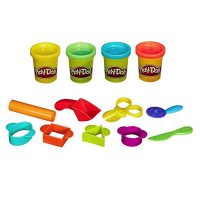
Yes, we know it’s messy, and, yes, it probably will get mixed into your carpet. Absolutely, your child will definitely eat some at some point. Oh, and yes, if you like things to be orderly, the inevitable mash up of colours will trigger you. However, Play Doh is such a great toy for little hands to hone those fine motor skills ready for school. It will also keep them occupied for at least ten minutes so you can enjoy a cup of warm tea. This cute starter set comes with a Mumblog tested durable storage bag and a range of tools for manipulating the dough.
Marble Run
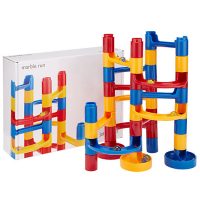
Marble Runs might seem a little simple, especially in this age of smart devices, but they encourage children to develop their ability to create complex connections, a skill that will be vital once they start school. This basic set has a myriad of possibilities to be explored, providing hours of fun.
Orchard Toys Shopping List
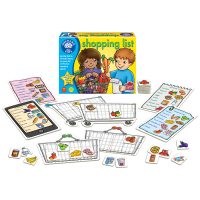
Orchard Toys do a fun range of education toys largely aimed at pre-schoolers. All of their toys are made in the UK, cutting out the carbon footprint that comes from importing from overseas. This Shopping List toy is one of their bestsellers, and it’s easy to see why. The fun game gives each player a card with a list of items to buy from the shops, including pictures. Players take turns to turn over cards with an item on each one, and if they find a matching one they can keep it. Whoever completes their list first wins. Players need to pay attention when cards are turned over to try and remember the location of items they need for when its their turn. The game tests children’s memories and teaches them about various items available in the shops.
Younger Primary: 5 to 7 Years
Your child is now at school and soaking up new information every day. It’s important that kids at this age get plenty of down time to relax, as those early years in primary school can be very tiring. That being said, there are plenty of toys that encourage learning through play in a subtle and gentle way.
Market Set Art Case
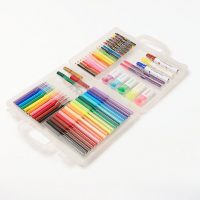
Developing good pen control is an important part of key stage one learning, and practice, practice, practice makes perfect. No child should be sat writing sheets of handwriting every day outside of school hours, but you can help build those muscles needed for penmanship by encouraging their creative side. This amazing set has over 50 different pens, pencils and crayons. It even includes some magic pens that can be used to create secret notes, and the carry case keeps everything neat and portable!
Galt STEM Science Lab
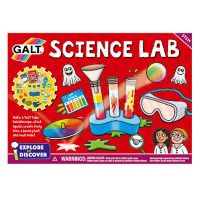
Mumblog have tested out this kit and we were pretty impressed. It’s a fun way of introducing your child to some simple scientific concepts. The kit has plenty of hands-on and visual experiments that will really hold your child’s attention. The kit is aimed at children aged six and above but due to the visual nature of the experiments children aged four and up will enjoy using it with their parent’s help and supervision.
Tangram Puzzle
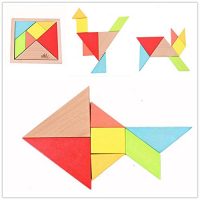
If you watched the BBC’s documentary, No More Boys and Girls, last summer then you will probably be familiar with the benefits of the humble Tangram Puzzle. This simple seven-piece puzzle, imported from China to Europe in the early part of the 19th century, promotes numerous skills in children, such as problem-solving and spatial awareness. It offers up a number of possibilities for puzzles, with the seven pieces being used to create a variety of different shapes.
Older Primary: 8 to 11 Years
Now your child is older, it’s probably increasingly difficult to divert their attention away from tablet computers and game consoles. That being said, their ability to concentrate on longer craft or science projects is much better, as are their problem-solving skills. Capitalise on this by choosing some presents that require a little creative filling and will develop their understanding of key subjects.
Science4You Sweet Factory
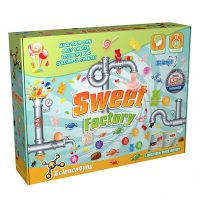
Nothing motivates kids faster than sweets, and with this excellent kit from Science4You, your child can combine their love of all things sugary with science. Children can create different coloured sweets, make interesting and sweet concoctions to drink, and experiment with various snacks. There are 40 experiments in total. It’s worth noting that adult supervision is strongly advised. You probably don’t want to mention it to your child’s dentist either.
BrainBox – The World
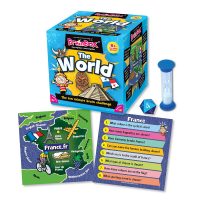
Your child can learn a plethora of facts about 68 different countries in this fast-paced game that requires very little set up and no additional extras. Each person takes turns to pick up a card, and they are given ten seconds to study its facts. After ten seconds they must turn the card over and answer one of the questions about the facts. Answer correctly and the player keeps the card. At the end of the game the player with the most cards wins. This particular set covers geography, but Brainbox has a whole range of games that cover science, maths, nature, history, and much more.
4M Green Science Potato Clock
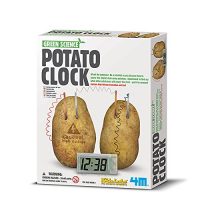
This is a great little stocking filler that can help your child get a greater understand about how electricity works. There is a clear set of instructions that show how to set up the various wires and metal strips to power a digital clock using a potato. Your child can use various other fruits and vegetables to see if anything else can be used to power the clock (hint, lemons work best). It’s a fun way of encouraging your child to think of an idea and then test it out, in the same way that scientists do.




